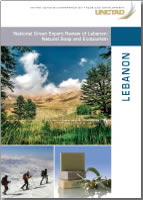
This report presents the findings of the Lebanon National Green Export Review (NGER) conducted between 2016 and 2018 through a partnership between the Lebanese Government and UNCTAD.
It analyses green production and export opportunities in the natural soap and ecotourism sectors and comprises national action plans to develop green exports in each sector.
The Natural Soap Sector
Made from olive oil, Lebanese natural soap is free from harmful synthetic ingredients and known for its skin moisturizing properties. Various natural soap products are produced in Lebanon including bar soap, aromatic soaps, liquid soaps and skin care products.
The NGER identified the following strategic priority areas for the development of green production and export in the natural soap sector: marketing, packaging and labelling, coordination, cleaner production, capacity building, access to finance and regulatory environment.
The conclusions from the sector study were validated by national stakeholders during a workshop organized in Beirut in September 2018. At the workshop, industry and government representatives formulated and adopted three priority actions for the sector, namely to:
-
Support natural soap producers to comply with international standards.
-
Enhance the infrastructure of soap production.
-
Develop a specialized Micro, Small and Medium-Sized Enterprise (MSME) cluster for the soap industry.
The Ecotourism Sector
The tourism sector has long been one of Lebanon’s leading economic sectors, representing a major source of national income and employment.
Six strategic areas were identified to promote the development of the sector: environmental sustainability, development of ecotourism products, social inclusion, regulatory and institutional frameworks, marketing, and communications.
These strategic areas along with findings from the sectoral analysis were presented to national stakeholders during a validation workshop held Beirut in March 2018. As a result of the workshop stakeholders collectively agreed to prioritize three main actions, namely to:
-
Set up an enabling institutional and regulatory framework for ecotourism.
-
Increase the socioeconomic impact of ecotourism in rural communities through cross sectoral linkages and value addition enhancement.
-
Develop and implement communication campaigns to promote Ecotourism.




